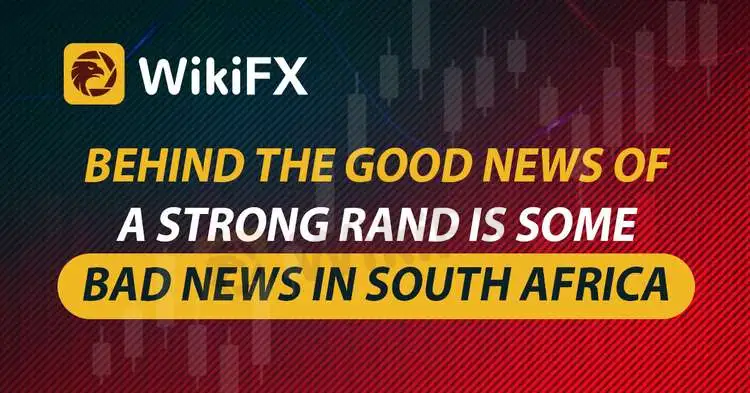Behind the good news of a strong rand is some bad news in South Africa
Abstract:A strong rand typically makes all South Africans happy since it represents a vote of confidence in the country. The rand, on the other hand, is being propped up by expectations that the South African Reserve Bank would undertake a more aggressive rate-hiking cycle to head off any stagflationary price shocks in food and petrol, while maintaining in lockstep with the US Federal Reserve's more hawkish posture.

A strong rand typically makes all South Africans happy since it represents a vote of confidence in the country. The rand, on the other hand, is being propped up by expectations that the South African Reserve Bank would undertake a more aggressive rate-hiking cycle to head off any stagflationary price shocks in food and petrol while maintaining in lockstep with the US Federal Reserve's more hawkish posture.
A strengthening of the rand is usually a reason for jubilation because it is viewed as a statement of confidence in the economy and financial markets. However, hopes that the SA Reserve Bank (Sarb) would move decisively in the face of approaching inflation threats and remain in lockstep with the Fed during its rate-hiking cycle support its present strength and resilience.
Both Sarb and the US Federal Reserve are expected to frontload interest rates in their fight against inflation at some point, boosting them by 50 basis points all at once and then gradually increasing them from there, according to economists. For the current rate-hiking cycle, the Fed's starting point is historically low-interest rates, whereas Sarb's is higher.
The rand is now giving a 7.1 percent carry trade return - the number of profit investors can make by investing in one currency versus another dependent on the level of domestic interest rates.
The carry trade yield in South Africa is only surpassed by the Brazilian real, Chilean peso, and Colombian peso – the other emerging market commodity-producing countries that have gained ground on rising commodity prices – with government bond yields trading at a significant premium to developed market interest rates.
Investors are taking advantage of this premium at a time when they are plainly satisfied with the degree of risk that South Africa provides to their portfolio, particularly in comparison to the bigger macroeconomic and geopolitical concerns that exist in the Northern Hemisphere. Because it is geographically far from the Ukraine war zone and less likely to be affected by any potential greater European consequences, it appears that South Africa is suddenly being regarded as a safe haven.

According to Bloomberg numbers given by Investec analyst Annabel Bishop, the rand has gained 6% year to year, compared to a 7.8% loss over the same period last year, making it the fourth best-performing emerging market currency this year.
The rand's strengthening to R14.8 per dollar was fueled by R2.9 billion in portfolio inflows into SA bonds in only two days this week, with foreigners taking advantage of the 50 basis point spike in SA bond rates since Russia's war began over a month ago, according to Bishop.
Considering our financial markets' depth and liquidity, the rand's capacity to weather rising economic and geopolitical turmoil in recent weeks is noteworthy, given that it is generally the first emerging market currency to be sold off when investors flee for shelter.
But, with no end in sight for the conflict and the outlook for domestic and global inflation becoming increasingly bleak, will it be able to prolong or hang on to these gains?
Rising energy and food costs, trade disruptions, and fresh supply-side limitations emanating from the Russia-Ukraine war, according to BNP Paribas, could push inflation in developing economies up four percentage points to 10% this year. That's double-digit inflation, which no one wants to hear because it implies that hard times are on the way.
On the local front, Jeff Schultz, a senior economist at BNP Paribas South Africa, believes Russia's conflict will have serious, long-term consequences for global supply chains, commodities prices, and global inflation. He reminds out that, up to this point,
However, he warns that inflation expectations could become a problem, with consumers expecting more entrenched higher inflation in response to “the substantial price shocks the economy is about to face in fuel and food price increases (the latter two components accounting for the majority of lower income-expenditure deciles).”
As a result, he has raised his bank's inflation prediction for South Africa by 50 basis points to 6.5 percent in 2022, up from 6 percent earlier.
Given the worsening inflation picture, Schultz believes that front-loading may become a tactic for Sarb in subsequent meetings as it “tries to nip inflation expectations in the bud and build up buffers against a more uncertain global environment.”
Because higher interest rates would not solve high global wheat prices or unblock supply chain disruptions, Absa economist Peter Worthington, who expects CPI to rise sharply in the coming quarters, does not believe aggressive rate hikes “in the face of a stagflationary shock” would be an appropriate policy response.
“Although extreme tightening would not be prudent at this time, especially given the stability of the rand,” he says, “We feel some tightening is required to cope with the reality that inflation expectations may have shifted further away from the 4.5 percent target.”
Sarb should be applauded for keeping a careful check on inflation and is likely to do so in the future.
Upside inflation risks are emerging, and the Fed may have no choice but to respond with the firepower required to moderate greater inflation expectations before they take hold.
In an otherwise bleak macroeconomic climate, this means a rand explosion is improbable - excellent news in an otherwise bleak macroeconomic situation.

Related broker





Read more

Charles Schwab Review: Traders Claim Illegitimate Profit Cancellation, Trade Manipulation & More
Have you been lured into the Charles Schwab app for trading on the back of outrageous profit claims by the broker? Did you fail to receive any of these? Does the broker deny withdrawals every time you request and cancel your forex trading account? Have you been victimized financially by its trade manipulation? Act before you are left with a NIL balance in your account. Many traders have questioned Charles Schwab customer service and many other operational executives for the aforementioned illegitimate trading activities. In this Charles Schwab review article, we have shared some of their comments. Read on!

AMP Futures Exposed: Traders Raise Alarms Over Illegitimate Account Blocks & Bad Customer Service
Has AMP Futures blocked your forex trading account? Does it fail to provide any explanation for this act? Do you face issues concerning deposits to your AMP Futures account? Is the customer service non-existent for any trading query you raise with it? You are not alone! Many traders have been facing these issues upon AMP Futures login. Some of them have commented on AMP Futures review platforms. In this article, we have shared some reviews that you can look at. Read on!

FXGlory Review: Vanishing Profits, Capital Scams & Withdrawal Charges Keep Annoying Traders
Does FXGlory remove all your forex trading account balances upon fund withdrawal requests? Or do you witness incorrect trading account balances after fund withdrawals? Does the Saint Lucia-based forex broker charge you for fund withdrawals? All these and many more scam-related complaints have been filed against the forex broker. In this FXGlory review article, we will discuss several complaints. Read on!

PINAKINE Broker Review: A Complete Look at Its Services and Risks
Finding a trustworthy broker from the huge and often confusing world of online trading options is one of the biggest challenges a trader faces. In this competitive market, PINAKINE Liquidity Limited has appeared, getting attention with promises of high leverage and zero-commission trading. However, a closer look shows important factors that every potential client must think about before investing. The most important thing to consider with PINAKINE is that it has no regulation. This fact completely changes how risky the broker is and has major effects on how safe your investments will be. This review gives a complete and fair examination based on information available to the public. We will break down its services, trading conditions, platform technology, and the possible risks involved, helping you make a fully informed decision.
WikiFX Broker
Latest News
BASF CEO: EU CO₂ Trading Is A "Destruction Mechanism" For European Industry
Rate Calc

